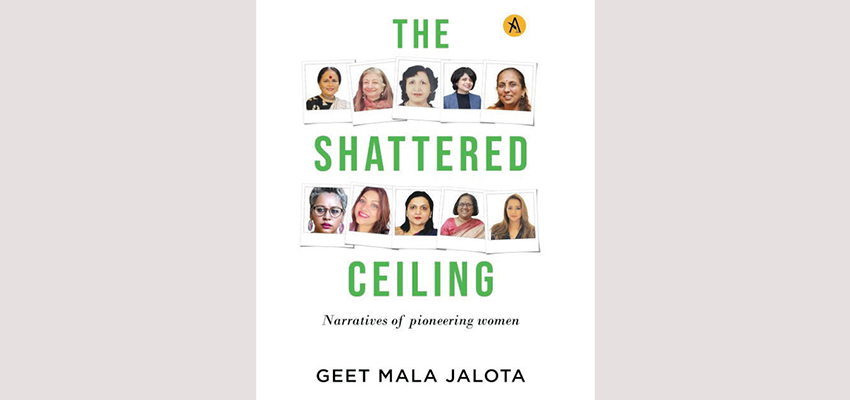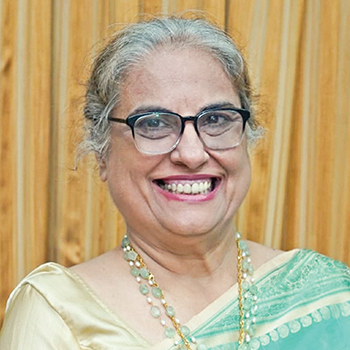Shattering ceilings, Breaking new ground

Senior HR Professional and trainer Geet Mala Jalota recently launched her book, “The Shattered Ceiling: Narratives of pioneering women”. This collection of interviews features ten eminent women who are pioneers of Indian industry
Ashattered ceiling is an interesting metaphor. Despite the chaos inherent in the word “shattered”, it actually signifies progress and promise.
All the more so, because the book - “The Shattered Ceiling: Narratives of pioneering women” features interviews of ten luminaries.
They are Deena Mehta, the first lady trader and former president of the Bombay Stock Exchange; Sucheta Shah, executive director, Atlas Integrated Finance; Vijayalakshmi Chhabra, the first lady director general of Doordarshan; Anuradha Deb, noted coach, therapist and founder of the Process Work Institute of India; Anita Khurana, the first lady appointed as commercial director of Indian Airlines (Air India post-merger); Kresha Bajaj, entrepreneur; Sanju Yadav, Pharma Business Head; Panchali Mukhopadhyay, VP, Sales and Marketing at Herbalife; Sushmita Chakraborty, Associate Director at CSC India and Kanika Mohan Saxena, VP of Digital Content Services at Vodafone Idea Limited, who also happens to be India’s second lady master scuba diving trainer.
Explaining her objective in writing the book, Geet Mala said: “The idea is to showcase these role models and provide the next generation of working women with the knowledge and support needed to navigate their careers confidently. Indian corporate sector needs to acknowledge the contribution these women have made, opening different sectors of industry for women’s entry and setting a trend for aiming high.”
The USP of the work is its sheer relatability despite the success level of the women. Even as each interviewee candidly answers questions on how to walk the tightrope between home and work, navigate workplace politics and make her choices visible, the narratives feel familiar and resonant.
Each of the 10 women featured is a powerhouse in her own way; thus, every single story is a celebration of diversity in leadership and achievement, and assures each young girl out there that her dreams are valid and attainable.

Said Jalota, who launched the book at the Mumbai Press Club recently: “I have been fortunate that all the ladies featured here have unreservedly answered my questions on how to balance work-life, how to choose their career and make the most of their God-given strengths at the workplace.”
Adding further value to the narrative is the detailed resume and a synopsis of the important points called “My take” by the author which not only gives us a flavour of the individual woman’s personality but useful tips on negotiating the ups and downs of life. Take, for instance, Geet’s comments on Sanju Yadav’s pharma career, “There is a telling point in Sanju’s narrative where she mentions about the corporate reality being the opposite of family expectations. That becomes a stumbling block in my view. So either reality has to change, or expectations have to change if this patriarchal society wants to see its women realise their potential. Why an industry which runs on scientific discoveries and patents still has a gender skew, is a mystery. Unlike the West, where efforts are made to attract young girls into STEM (Science, technology, engineering and mathematics careers), there’s minimal effort to attract girls to a pharma career in India. This, despite India being the leading provider of capable and well-qualified pharma talent to the world, though gender skewed.”
Also, her take on Deena Mehta, the first woman president of the Bombay Stock Exchange, “Women are absent from some professions not because of their gender but because they have not found it worth to venture there. The most important pointer given by Deena is that the penetration of mutual funds in the Indian stock markets is barely 6 to 7 per cent compared to 40 to 50 per cent the world over. Even finance students after graduation can establish themselves as MF advisers and turn entrepreneurs. Institutions that have set up employment training centres can use this statistic to train girls as entrepreneurs.”
About Vijaylakshmi Chhabra, former Doordarshan head, she says, “Her golden words indicate that women have to work from their natural strengths and take a long-term view of their career. Through processes and structure, the next generation can take an inclusive ideology further, make it more encompassing and compelling.”
Meanwhile, Kanika Saxena’s story is inspiring for all the right reasons. “Millions stuck in unsatisfying jobs must learn from her,” writes Geet. “Even if you are doing what you don’t enjoy, don’t miss out on the opportunity to be the best at it. You never know when your true love will turn up. The high standards she sets for herself and the way she drives herself to achieve them, is her innate approach to anything she sets her heart to do, be it media or diving.”
“The Shattered Ceiling” is set to become a significant contribution to the discourse on gender diversity and women's empowerment in India, providing valuable insights and inspiration to women to break through their own ceilings.